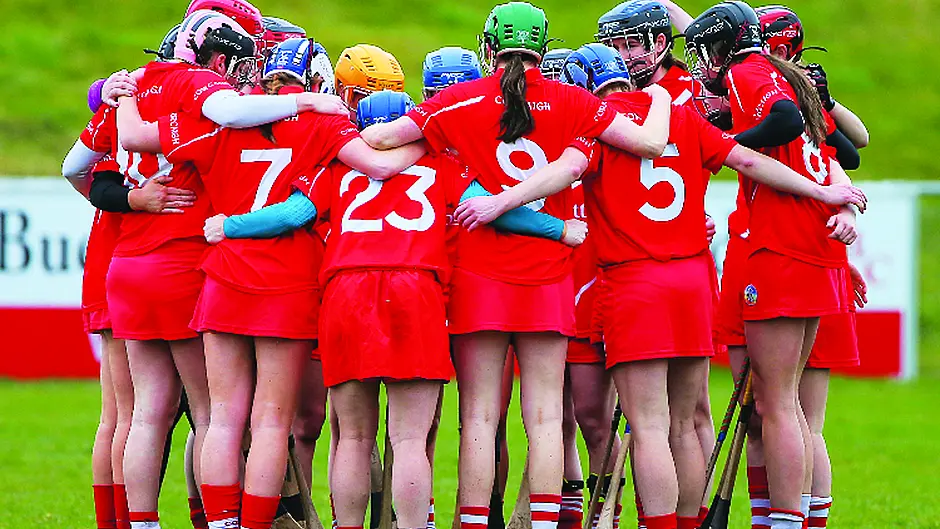Our star columnist explains how the modern-day inter-county camogie player is professional in all but name
THE modern-day inter-county camogie player is professional in all but name.
We’ve all read and heard of the lengths that our male counterparts go to these days to reach the top of the GAA ladder but the same applies to camogie and ladies’ football. You put your life on hold for your county.
Right now, these are busy times for Cork’s players as we’re in the middle of the group stages in the Liberty Insurance Senior Camogie Championship. It’s so far, so good for Paudie Murray’s team with three wins from three in Group 1, as Waterford, Clare and Offaly have all been beaten. The early signs look encouraging, as Cork chase a third All-Ireland senior title in a row.
The bigger tests, against both Wexford and Limerick in the next two group games, lie ahead, but Cork look to be in a good position to mount a strong defence of their All-Ireland title.
However, five games in five weeks takes its toll on an inter-county camogie player, especially towards the end of the group stages. For that reason it’s so important that each player looks after themself, both physically and mentally, to ensure they get the best out of themself and to prevent fatigue or injury.
From past experience, at this stage of the year, the training sessions mid-week are curbed in a way that keeps players fresh for the weekend games. It’s a difficult balance to achieve, especially when there may be weaknesses revealed in past games that need to be worked on.
Players also need to take responsibility themselves to ensure they are not overtraining in the individual work they put in, whether it’s with their club or extra gym work. Nutrition and mental preparation are other major factors that players need to look after, and I believe these are more important than the actual physical training you do at this stage of the year.
I’ve zoned in on one particular Cork inter-county player to discover how she prepares for championship games. This player – who wishes to remain anonymous – has a very professional approach towards camogie and treats it as a job.
The work she puts in on a weekly basis is phenomenal, both in her eating and her physical sessions, and she goes above and beyond any other player I know to ensure she can give her best to Cork camogie.
The following is a breakdown of the training she endures on a weekly basis, her eating plan and the extra preparation she applies in the lead-up to a hefty five weeks of championship games.
Monday: Gym for 40 to 50 minutes (power, plyometrics, injury preventative programme) at moderate intensity (high intensity in pre-season).
Tuesday: Inter-county camogie training, approx 80 minutes (high intensity: speed-work, skills, modified games, tactics).
Wednesday: Gym for 40 to 50 minutes (similar to Monday, but different exercises, moderate intensity); ball alley for 20 minutes (skill work, low intensity); call to club training but wouldn’t train at this time of year.
Thursday: Inter-county camogie training (similar to Tuesday but less intense and not as long the Thursday before a game, approximately 60 minutes).
Friday: Stretching using a foam roller, which is great for recovery. This is a rest day and recovery is vital.
Saturday: Championship games for five weeks in a row.
Sunday: Recover from the match, go to the pool or ice-bath if needed. This is a rest day. Call to club training if home.
As you can see, a full week has to be dedicated to the game on the Saturday; it consumes the entire week’s schedule and needs to be treated in a professional manner to get the best out of the player.
Now, let’s look closely as her nutrition routine.
Breakfast: porridge with fruit and flaxseed mixed in.
Snacks: Fruit (banana, orange, apples), nuts, raisins and yogurt. Healthy options also make you feel fuller for longer and the natural sugars in the fruit curb the sugar cravings you may feel during the day.
Lunch: High protein options, particularly after a morning gym session, such as chicken, steak, tuna or an omelette. Leftover dinner from night before for better time management.
Dinner: Light early dinner or sandwich on Tuesday and Thursday (training days). Few squares of chocolate (she asked me to leave this out but it made me feel better to leave it in as everyone deserves a treat!)
Post-training: A glass of milk, water for hydration and a bowl of porridge.
This player maintains a very healthy diet and it’s vitally important that she replenishes lost energy stores in her diet by carefully choosing the right foods for her body. This food plan can change depending on training levels and matches. Some players take a recovery drink after games to help speed up recovery in the muscles but most of this protein can be found naturally in food.
Training the emotional side is also so important, and according to this inter-county player, ‘training is a great stress reliever, be it from work or the everyday stresses of life. It allows you to forget about whatever is going on in your life and pushes you to focus solely on the ball.’
Emotionally, training takes its toll so getting the right balance is essential. Many of the younger players over-train due to their involvement with underage teams so it’s necessary for those players to get the right balance.
It’s impossible to train every night so the rest days are vital, not only for recovery but to ensure hunger and freshness are present mentally and physically. The gym sessions get shorter as the championship starts and you’re using it to maintain strength and as an injury preventative measure. A lot of girls work on their own programme and so can do it whenever it suits them during any given week. It’s away from the pitch and it usually lasts 30 to 40 minutes and the benefits are huge so it’s important to have at least one session a week during championship.
It’s championship matches that take the most out of players, especially when travelling to games. There is a physical and mental drain playing the match, and an emotional strain – winning or losing the game or a player’s own personal performance.
Hopefully, this has given you an insight into the professionalism that has now crept into the camogie season at inter-county level. It is this dedication and precision planning that has helped Cork camogie to be successful on a yearly basis. Yes, it also takes talented players but hard work beats talent every time.










